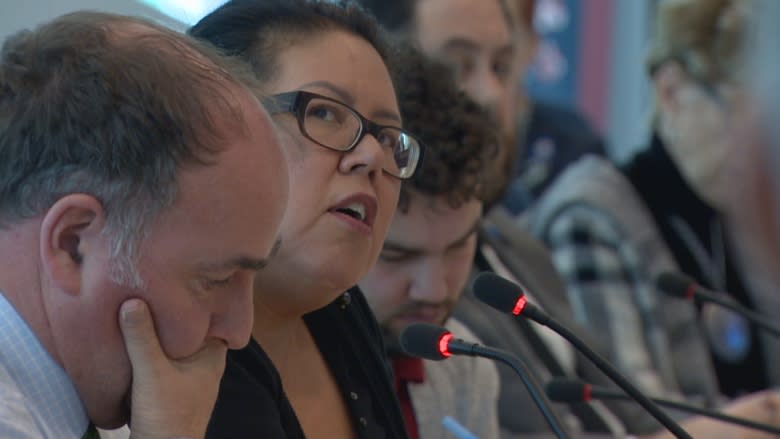Retrofit for old remand facility pitched as new centre for Edmonton's homeless
More than a dozen agencies that work with the homeless want to turn the old remand centre in Edmonton's downtown into a pioneering new community centre offering comprehensive services for the city's vulnerable.
The plan for the old jail at 97th Street north of 103A Avenue was taken to the Edmonton Police Commission at a public meeting Thursday.
"The goal is to break the cycle of poverty, homelessness and ill health," said Cheryl Whiskeyjack, executive director of the Bent Arrow Traditional Healing Society.
Whiskeyjack gave a formal presentation to the commission alongside another partner in the proposal, Julian Daly from Boyle Street Community Services.
In all, 16 agencies that work with the homeless supported the proposal.
Daly told the commission that while the new centre will not be a "silver bullet" to end homelessness, the integrated approach will be far more effective than what currently happens in the city.
He said a number of agencies work in a "fragmented way" at the moment.
If the new centre were to be realized, Daly said a range of services would be available under one roof from a detox centre, to social housing for 100 people.
Services and supports under one roof
The centre would also include mental health and addiction supports, as well as primary health care, employment training and a 24-hour drop-in centre complete with laundry and shower facilities.
"The chances of people accessing services if they're all in one place are hugely increased — we know that," Daly said.
Apart from the support agencies, the collaboration also includes the Edmonton police and Alberta Health Services.
As well as programming from Alberta Health Services, the Boyle McCauley Health centre would also set up in the space.
Daly said a business case has already been submitted to the Alberta government, which he hopes will become the biggest investor in the project.
Of the projected $93 million the facility would cost, Daly said he is hoping various levels of government will be able to contribute $70 million, adding that the centre will save millions of dollars a year in health and judicial costs.
Daly said repurposing the remand centre is the best of the options that have been looked at because the building is available and has 200,000 square feet to work with.
The agencies did consider the fact that many of their clients may be traumatized by returning to a place they may have done time in the past, but decided that would be part of a healing journey.
Police chief supports the proposal
Given so many inner-city clients are Indigenous, there's a strong cultural recognition of that in the building's plans, which have been designed by an Indigenous architect.
Edmonton police Chief Rod Knecht said he was impressed with the presentation and supports the idea.
He said he's in favour of keeping people who are homeless, mentally ill or struggling with addictions out of places like the drunk tank.
"These are people who are in need of help. And so to take them into a 12-foot cement block and leave them there for eight, 10, 12 hours while they sober up and then release them, I think that's pretty archaic thinking," Knecht said.
Because the proposal is to modify an existing building, Daly said the project would be relatively quick to complete, estimating it could be done within a year and a half.
He said the need is urgent now with every room and hallway jammed with vulnerable people at the Boyle Street centre.
There are also plans to redevelop the Boyle Street building at 101st Street and 105th Avenue, but those are long-term.
Concepts are being brought forward for affordable family housing in the space, as well as the possibility of an Indigenous hotel.
But Daly said the priority is to try to secure funding to overhaul the old remand centre and, while expensive, he insists the need is critical.
"We've seen at least a half a billion dollars being invested in one way or another into the arena. We've seen several hundred million being invested into the new museum," he said.
"We think it's an opportune moment to invest in some of our most vulnerable citizens."




